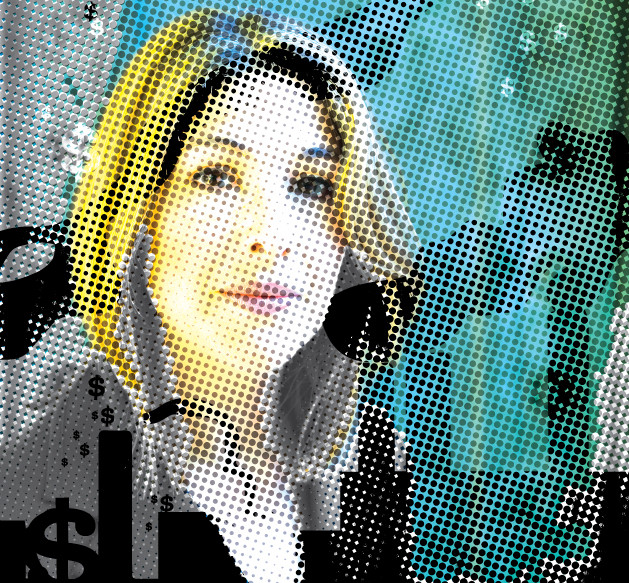Illustration by Matt Honda
“Climate change changes everything,” author-activist Naomi Klein told a packed house at the University of Hawai‘i at Mānoa’s Campus Center in February. “We’re in a suicidal phase of the fossil fuel economy and the most extreme forms of extraction.” Like an apocalyptic vision, Klein described the evils of current energy practices: fossil fuel companies cutting off mountain tops for coal, spilling millions of gallons of crude oil into the ocean through deep-sea drilling, and contaminating drinking water through hydraulic fracking.
Only in her mid-40s, the Canadian writer sounded more like an Old Testament prophet as she railed against the corruption and greed of the powerful oil companies—huge corporations that she strongly believes are destroying the planet. Toward the end of her sobering talk, Klein rallied the huge crowd, saying how people have the power to stop these extraction companies and their growing control over government: “Now we need to fight, and we can’t afford to lose.”
Invited to Hawai‘i as a visiting scholar (she served as the Dai Ho Chun Distinguished Chair in the UH College of Arts and Sciences), Klein’s visit couldn’t have been more timely. Just weeks before, the UH Board of Regents had voted to support a plan to divest from fossil fuels, a measure many universities around the country are beginning to take.
Along with teaching a seminar at the university, Klein and her husband, documentary filmmaker Avi Lewis, gave a series of provocative talks around Honolulu discussing climate change and her new book, This Changes Everything: Climate vs. Capitalism. In it, Klein writes about the rise of what she calls “Blockadia,” wherein ordinary citizens step in to fight the failings of their government, and, in particular, fossil fuel extraction by the world’s largest and most profitable oil, gas, and coal companies. “The rise of Blockadia is, in many ways, simply the flipside of the carbon boom,” she writes, further describing it as a popular uprising against the “new and amplified risks associated with our era of extreme energy (tar sands, fracking for both oil and gas, deepwater drilling, mountaintop removal coal mining).”
Putting herself on the front lines of the climate change movement, Klein has become a leader in the fight against the Keystone XL Pipeline. The controversial pipeline would carry Canadian tar sands oil (what Al Gore called “the dirtiest fuel on the planet” during a 2014 appearance at UH) across the middle of the country, exposing pristine prairies, forests, and waterways to devastating oil spills. A Canadian with American roots, Klein believes both countries will suffer disastrous environmental consequences if the Keystone Pipeline is built. She has joined many demonstrations around the world, including a 2011 protest outside of the White House in Washington, D.C. that resulted in her arrest. Despite a hard-fought and seemingly uphill battle, Klein believes the combined efforts of the Blockadia movement and her fellow “climate warriors” are finally paying off.
“Obama vetoed the Keystone Pipeline today,” Klein tells me when we meet on a warm evening in Waikīkī, waves lapping at the shore just steps from where we are sitting. “The only reason this happened is because people got together to stop it and made this happen.”
Klein seems to have an almost prophetic sense of timing. Her first book, No Logo, came out right before the World Trade Organization (WTO) riots in Seattle, and it soon became a bible for the anti-globalization movement. Her second book, The Shock Doctrine: The Rise of Disaster Capitalism, was published in 2008 during the financial crisis. In the midst of the chaos, Klein explained how emergency bailouts were used to systematically override democracy and to enrich those corporate and banking elites responsible for the collapse.
Klein’s new book, This Changes Everything, was published in September, just weeks before the largest climate march in history. More than 400,000 people took to the streets of New York, demanding action on climate change. Similar protests took place around the world; in Hawai‘i, more than 200 people marched through Waikīkī with signs declaring, “The Seas Are Rising and So Are We!”
Hawai‘i, Klein says, has a high degree of ecological consciousness, placing it on the front lines of climate change, especially in terms of clean, renewable energy. “But I don’t have to tell you that the profit motive is getting in the way of what the people want in Hawai‘i,” says Klein, referring to HECO’s glacial pace in embracing renewable energy and its possible takeover by NextEra, a resource energy company seeking to ship natural gas to the islands. “It’s insane and massively dangerous, and it’s also expensive,” she says.
As a mother and activist, Klein believes people are capable of profound change. But as an author and political analyst, she knows all too well how powerful elites will not give up their power unless the people demand it. “It’s a historical moment for Hawai‘i,” Klein says. Will Hawai‘i heed Klein’s prophetic forecasts, stepping up to lead the clean energy revolution, or will it sit back and suffer the consequences of climate change and sea level rise? Either way, it’s our choice.
This story is part of our Apocalypse Issue.

